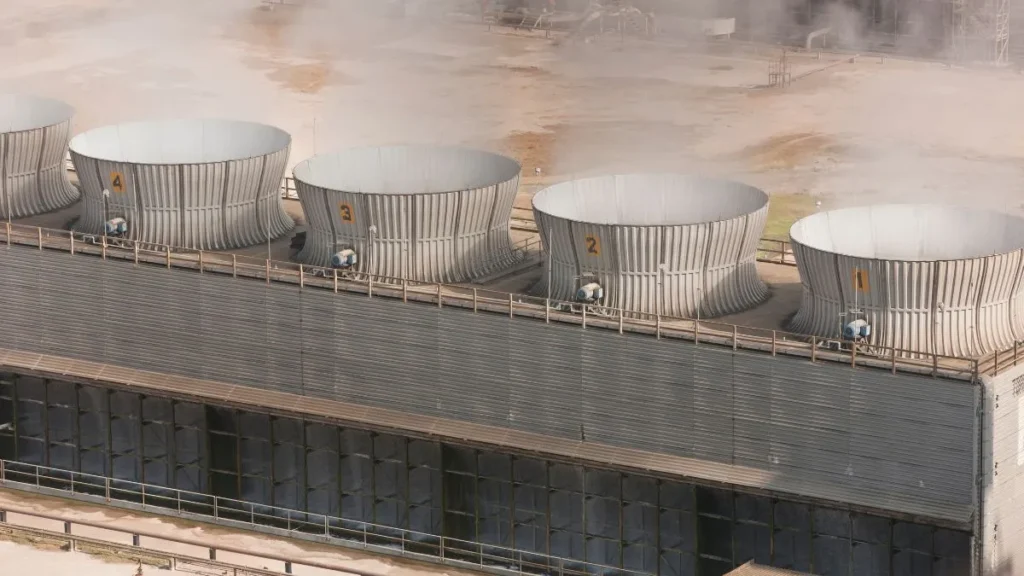In water treatment systems, especially in cooling systems, scale formation due to mineral deposits such as calcium carbonate and magnesium is a common challenge that can reduce heat transfer efficiency, increase energy consumption, accelerate equipment failure, and increase operating costs. To overcome this problem, scale inhibitors are essential; these are special chemicals designed to prevent scale formation on the surfaces of pipes and heat exchange equipment.
What is a Scale Inhibitor?
Scale Inhibitor is a chemical compound used in water treatment systems to prevent the formation of mineral scale on metal surfaces or other materials in the water circulation system. This material works by disrupting the crystallization process of salts that tend to form hard deposits (scale). By inhibiting or delaying the crystal formation process, Scale Inhibitors keep the system clean, efficient, and free from potential damage.
The use of scale inhibitors is very common in systems such as cooling towers, heat exchangers, boilers, and reverse osmosis systems.
Types of scale that can be prevented by scale inhibitors include:
- Calcium carbonate (CaCO₃)
- Calcium sulfate (CaSO₄)
- Silica and silicates
- Strontium sulfate
- Barium sulfate
- Magnesium hydroxide
The presence of scale inhibitors allows the system to operate in higher concentration cycles, without the risk of excessive scaling, thus contributing to water and energy efficiency.
Read Also: Antiscalant: Anti-Scaling Solution for Reverse Osmosis
Types of Scale Inhibitors
Scale inhibitors have various formulations and types, adjusted to the characteristics of the water, operating temperature, and type of system. Here are some types of scale inhibitors that are commonly used in water treatment:
1. Phosphonates
Phosphonates are one of the most popular types of scale inhibitors. This compound has a phosphonate group that is very effective in binding calcium and magnesium ions, and is able to work in a wide range of pH and temperature. Phosphonates also have a dispersant effect that helps prevent small particles from forming scale.
2. Organic Polymers
Organic polymers are usually used as scale inhibitors and dispersants. They work by disrupting the crystal growth process and also keeping particles suspended in water so they don’t settle. Its advantage is its high ability in water conditions with high levels of heavy metals.
3. Phosphates and Polyphosphates
This type has long been used as a scale control agent, although it is currently being replaced by phosphonates and polymers that are more stable and effective. Phosphates work by forming complex compounds with metal ions that cause scale.
4. Organic Acid-Based Scale Inhibitors
Used in special applications, especially when an environmentally friendly scale inhibitor is needed. Some citric acid or gluconic acid-based products are effective in preventing light scaling, and are often used as a complement.
The selection of the right type of scale inhibitor is highly dependent on water analysis (including parameters such as hardness, alkalinity, pH, temperature, and TDS) and system design. Therefore, the use of scale inhibitors cannot be done carelessly without a deep understanding of the system.
Read Also: Scaling and Corrosion in Boilers: A Hidden Threat to Face
How Scale Inhibitors Work
In general, scale inhibitors work through the following mechanisms:
1. Threshold Inhibition
Scale inhibitors inhibit precipitation even at very low concentrations, far below stoichiometric concentrations. Inhibitor molecules bind mineral ions in solution and prevent them from forming crystal nuclei.
2. Crystal Distortion
At the crystal formation stage, scale inhibitors bind to the crystal surface, disrupting the growth of regular structures. As a result, the crystals formed become unstable and easily dispersed in water, so they do not stick to the surface of the system.
3. Dispersing Action
Certain scale inhibitors are able to prevent sedimentation by keeping small particles suspended in the water, so that they can be carried away by the flow and not settle in the system.
With these three mechanisms, scale inhibitors keep the system clean from scale, reduce maintenance needs, and extend the life of the equipment.
Scale-Free Systems, Starting with the Right Solution
As a company with more than four decades of experience in the water treatment industry, Lautan Air Indonesia understands that every system has unique challenges in scale control. Therefore, we not only provide high-quality scale inhibitor products, but also comprehensive services that include:
- Analysis of water characteristics through complete laboratory tests to determine the best formulation.
- Selection of the type and dosage of scale inhibitor that best suits your system needs.
- Technical assistance and regular monitoring to ensure the effectiveness and efficiency of chemical use.
- Operation & Maintenance (O&M) services, including system cleaning and preventive maintenance.
- Integration with digital control systems and IOT, to monitor system performance in real-time and optimize chemical use.
The combination of quality chemical products with integrated technical services makes Lautan Air Indonesia a trusted partner in keeping your water treatment system reliable and efficient. Contact us today for consultation and water treatment solutions that suit your operational needs.



